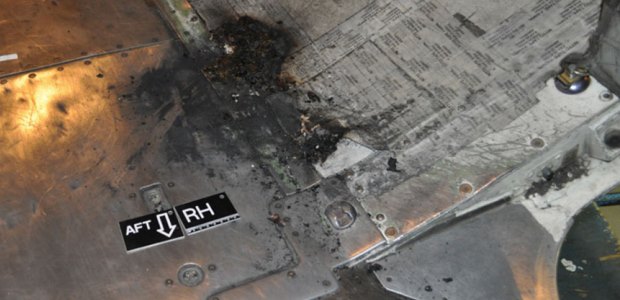
Report Highlights Threat of Lithium-Ion Batteries in Checked Bags
The Transportation Safety Board of Canada's investigative report on a baggage compartment fire during a WestJet flight in June 2018 says a damaged battery inside a passenger’s bag triggered it.
The Transportation Safety Board of Canada has released its investigative report on a baggage compartment fire that occurred during a WestJet flight in June 2018. The agency concluded a damaged battery inside a passenger's bag triggered the fire, which occurred shortly after takeoff of the Boeing 737-700 aircraft from Calgary International Airport.
The June 14, 2018, flight was bound for Vancouver International Airport with two flight crew members, three cabin crew members, and 53 passengers on board.
The report says a lower aft cargo fire warning light illuminated as the plane was climbing through 9,000 feet above sea level. The flight crew immediately followed the cargo fire procedures in the WestJet handbook, it says, explaining that they discharged one fire extinguishing bottle in the cargo hold, then declared a mayday emergency and landed safely 10 minutes later at Calgary International.
Airport fire and rescue personnel responded; they found no visible fire and detected no hot spots by themal imaging. The aircraft was then cleared to taxi to a gate, and the passengers and crew deplaned. Once ground crew personnel opened the lower aft baggage compartment, they found one passenger's bag showed signs of fire damage and there was minor thermal damage to the cargo hold's fire-resistant liner near that bag.
According to the report, the bag belonged to a passenger who "flew frequently for business purposes and was aware of WestJet's policies" that say e-cigarettes and the lithium-ion batteries associated with them must be in carry-on baggage only, not in checked bags. The passenger had inadvertently packed two spare lithium-ion batteries for his e-cigarette in a front pocket of his bag before he checked in the bag at the airport, the report states. The checked bag proceeded through security screening and was loaded into the cargo hold with the two spare batteries inside.
The report states that the TSB Engineering Laboratory analyzed the batteries and concluded that one of them experienced a thermal runaway that was likely caused by external damage, but the investigation could not determine whether the damage occurred before the battery arrived at the airport or during baggage handling.